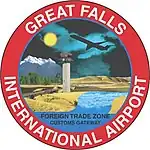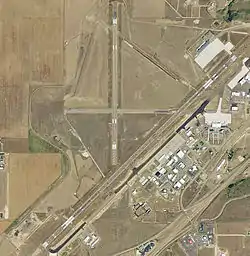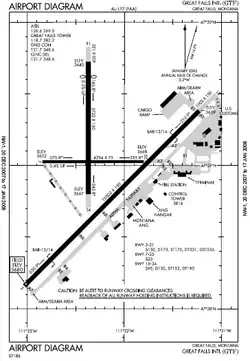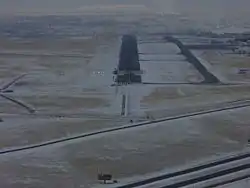Great Falls International Airport
Great Falls International Airport (IATA: GTF, ICAO: KGTF, FAA LID: GTF) is a public/military airport in city limits three miles southwest of central Great Falls in Cascade County, Montana, United States.[4] The airport has also been called Great Falls Municipal Airport.
Great Falls International Airport (former Great Falls Army Airfield) | |||||||||||||||||||
|---|---|---|---|---|---|---|---|---|---|---|---|---|---|---|---|---|---|---|---|
 | |||||||||||||||||||
 USGS 2006 orthophoto | |||||||||||||||||||
| Summary | |||||||||||||||||||
| Airport type | Public | ||||||||||||||||||
| Owner | Great Falls International Airport Authority | ||||||||||||||||||
| Serves | Great Falls, Montana | ||||||||||||||||||
| Hub for |
| ||||||||||||||||||
| Elevation AMSL | 3,680 ft / 1,122 m | ||||||||||||||||||
| Coordinates | 47°28′58″N 111°22′14″W | ||||||||||||||||||
| Website | www.flygtf.com | ||||||||||||||||||
| Map | |||||||||||||||||||
 GTF Location of airport in Montana  GTF GTF (the United States) | |||||||||||||||||||
| Runways | |||||||||||||||||||
| |||||||||||||||||||
| Statistics (2018) | |||||||||||||||||||
| |||||||||||||||||||


The National Plan of Integrated Airport Systems for 2011–2015 categorized it as a primary commercial service airport.[5] Federal Aviation Administration records say the airport had 143,811 passenger boardings (enplanements) in calendar year 2008,[6] 146,438 in 2009 and 155,204 in 2010.[7]
Great Falls International Airport is home to Great Falls Air National Guard Base, which hosts the Montana Air National Guard's 120th Airlift Wing (120 AW), the "Vigilantes." Operationally-gained by Air Mobility Command (AMC), the 120 AW reequipped with the Lockheed C-130 Hercules in 2014, which it employs in medium airlift missions. In its previous incarnation as the 120th Fighter Wing, it previously flew the McDonnell Douglas F-15 Eagle.
Malmstrom Air Force Base, home of the 341st Missile Wing (341 MW) of the Air Force Global Strike Command (AFGSC), is 10 miles (16 km) east of GTF, on the east side of Great Falls. With the transfer of its KC-135 aircraft in the 1990s, Malmstrom's 12,000-foot (3,700 m) runway is closed to fixed-wing traffic and open only to military helicopters, so Great Falls ANGB provides support for fixed-wing military aircraft visiting Malmstrom AFB.
History
Great Falls International Airport was initiated in November 1928. The airport was leased by the U.S. War Department during World War II and became a home for the 7th Ferrying Group (Air Transport Command) of the U.S. Army Air Forces during the war. Located on Gore Hill, the airport was known as Gore Field during its military use. During the war years, more than 7,500 bombers and fighter aircraft passed through Great Falls on their way to Europe and the Pacific. The U.S. Army acquired an additional 740 acres (3.0 km2) and built many buildings and other facilities. The airport was under government control until June 1948 when the Department of Defense deeded it back to the City of Great Falls with the stipulation that the facility could revert to military control in a national emergency. The airport was released from this clause in 1961.
In 1975 the terminal was replaced and all runways, aprons, and taxiways updated. With Federal Aviation Administration matching funds, the Great Falls International Airport Authority performs annual operations, maintenance, and capital improvements.[8]
The award-winning terminal was designed by Davidson-Kuhr Architects of Great Falls, Montana, with the lead architect being David S. Davidson.
Great Falls has had airline flights since the 1930s. For at least part of each year from 1977 to 1981 it saw scheduled Northwest DC-10s EWR-DTW-ORD-BIL-GTF-GEG-SEA and back.
In 2011 the airport recorded the most boardings (172,415) in its history.[9] GTF was the fifth-busiest of the state's 15 major airports in 2011, behind Billings (407,960 enplanements), Bozeman (397,822), Missoula (292,530), and Kalispell (179,034).[10]
In early 2012, Frontier Airlines announced new flights to Great Falls from the Denver hub. The Airport Authority hoped to address rising ticket prices and a seasonal shortage of seats with low-cost Frontier flights, but Frontier announced it was pulling out of Great Falls during its Denver hub restructuring in December 2014.
AvMax, a Calgary-based large jet maintenance and repair business, opened a large operation at GTF in 2006; they employ 150.
Model airplane collection
The terminal contains what is believed to be the world's largest collection of model airplanes.[11] 883 such airplanes are on display, about 2/3 of the entire collection. The models were built and painted by local Great Falls resident Bary Poletto from 1977 through 2003. He died in January 2013.
Facilities
The airport covers 2,113 acres (855 ha) at an elevation of 3,680 feet (1,122 m). It has three asphalt runways: 3/21 is 10,502 by 150 feet (3,201 x 46 m); 16/34 is 5,722 by 150 feet (1,744 x 46 m); 7/25 is 4,294 by 75 feet (1,309 x 23 m).[4]
In the year ending March 31, 2011 the airport had 41,591 aircraft operations, average 113 per day: 52% general aviation, 25% air taxi, 12% airline, and 11% military. 108 aircraft were then based at this airport: 61% single-engine, 17% military, 11.1% multi-engine, 8% helicopter, and 3% jet.[4]
Airlines and destinations
Passenger
| Airlines | Destinations |
|---|---|
| Alaska Airlines | Seattle/Tacoma |
| Allegiant Air | Las Vegas, Phoenix/Mesa |
| Delta Connection | Minneapolis/St. Paul, Salt Lake City |
| United Express | Denver |
| Destinations map |
|---|
All destinations from Great Falls International Airport Red = Year-round destination Green = Seasonal destination |
Cargo
| Airlines | Destinations |
|---|---|
| FedEx Express | Billings, Memphis, Reno |
| FedEx Feeder operated by Corporate Air | Bozeman, Fargo |
| FedEx Feeder operated by Empire Air | Bozeman, Kalispell, Missoula |
Statistics
Top destinations
| Rank | City | Passengers | Carriers |
|---|---|---|---|
| 1 | Denver, CO | 52,000 | United |
| 2 | Salt Lake City, UT | 36,000 | Delta |
| 3 | Seattle, WA | 23,000 | Alaska |
| 4 | Las Vegas, NV | 15,000 | Allegiant |
| 5 | Phoenix-Mesa, AZ | 9,000 | Allegiant |
| 6 | Chicago-O'Hare, IL | 1,000 | United |
References
- "Locations". Archived from the original on October 6, 2014. Retrieved September 29, 2014.
- "Great Falls International Airport - Montana on a budget". Business View Magazine. Business View Publishing. January 7, 2020. Archived from the original on October 25, 2021. Retrieved April 2, 2023.
- "2019 Montana Boarding Statistics" (PDF). mdt.mt.gov. Montana Department of Transportation. November 20, 2019. p. 4. Archived (PDF) from the original on August 3, 2022. Retrieved September 23, 2022.
- FAA Airport Form 5010 for GTF PDF. Federal Aviation Administration. effective November 15, 2012.
- "2011–2015 NPIAS Report, Appendix A" (PDF). National Plan of Integrated Airport Systems. Federal Aviation Administration. October 4, 2010. Archived from the original (PDF, 2.03 MB) on October 27, 2012.
- "Enplanements for CY 2008" (PDF, 1.0 MB). CY 2008 Passenger Boarding and All-Cargo Data. Federal Aviation Administration. December 18, 2009.
- "Enplanements for CY 2010" (PDF, 189 KB). CY 2010 Passenger Boarding and All-Cargo Data. Federal Aviation Administration. October 4, 2011.
- "Great Falls International Airport Authority Montana : Airport". Archived from the original on March 9, 2009. Retrieved July 28, 2009.
- Johnson, Peter. "Great Falls Airline Boardings Up." Great Falls Tribune. May 14, 2011.
- Airport Boardings Study. Aeronautics Division. Montana Department of Transportation. January 2011, p. 2-7. Accessed May 15, 2011.
- "Great Falls International Airport - Montana on a budget". Business View Magazine. Business View Publishing. January 7, 2020. Archived from the original on October 25, 2021. Retrieved September 23, 2022.
- "Great Falls, MT: Great Falls International". RITA BTS. Bureau of Transportation Statistics. Archived from the original on October 21, 2014. Retrieved September 23, 2022.
External links
- Great Falls International Airport, official site
- Montana Air National Guard
- Aerial image as of July 1995 from USGS The National Map
- FAA Airport Diagram (PDF), effective October 5, 2023
- FAA Terminal Procedures for GTF, effective October 5, 2023
- Resources for this airport:
- AirNav airport information for KGTF
- ASN accident history for GTF
- FlightAware airport information and live flight tracker
- NOAA/NWS weather observations: current, past three days
- SkyVector aeronautical chart for KGTF
- FAA current GTF delay information
